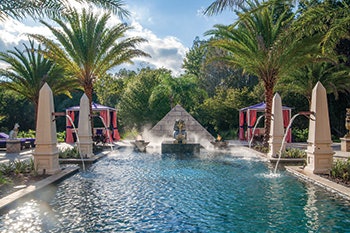
One of the intriguing themes that’s been covered in these pages and elsewhere over the past few years is the idea that often, great design requires a “less is more” approach. It’s a valid point, given that many aquatic spaces appear to be designed with the “everything but the kitchen sink” approach, with multiple features that create visual cacophony.
While I firmly agree that restraint can be extremely useful in design, there are also times when an over the top approach to design is exactly what’s needed.
Case in point: the project covered in this edition of AQUA Architecture known as the Pharaoh’s Palace. The exterior spaces for this remarkable “residential” project were designed and built by Florida’s Ryan Hughes, a gifted designer whose work is typically extremely tasteful and often restrained. In this case, however, he was asked to execute a purposefully lavish design.
The property is intended to serve as a set for an upcoming reality TV show about aspiring models known as the “Pharaoh’s Daughters,” living and training in the luxurious setting. By design, the space had to be palatial and exotic, all rendered in an ancient Egyptian motif. It’s the kind of project that wouldn’t work in the vast majority of settings or for most clients, but in this situation, Hughes’ work fit the bill to a tee.
What’s fascinating about this example of excess is that despite creating a design that some might view as way too much for their own tastes, Hughes employed a number of familiar aspects of sound architectural practice. One might say it’s excess with a purpose.
He and his team spent time researching the elements of Egyptian design, from studying structures like obelisks, columns and statuary to symbolism, color choice, material choice and spatial relations. There are key focal points and forced perspectives that lead the eye to striking views of the pool, spa area and other visual elements. The color and material palettes echo the work of ancient designers while also adding modern touches, including monolithic perimeter overflow structures to create sense of drama and elaborate lighting, fog and fire systems to generate visual mystery.
The features within the design are all scaled properly and, although elaborate in the extreme, the layout and scale create a sense of spatial balance. All the elements, down to the fabric on the lounge chairs and plantings associated with the Mediterranean and Nile Delta, work in harmony to create a place that feels like a royal ancient oasis or bath.
All in all, it’s one of the best examples I’ve yet seen of a project that is elaborate, yet still designed with taste, sensitivity, detail and appropriate historical references. Hughes and company did not create the environment and its lavish elements simply because they could, but instead to meet a specific design mission. In this unique setting with its unusual purpose, everything in the project makes sense.
In my work covering the design and construction side of our industry, I’ve seen literally scores of elaborate projects. Some have been done well, while many are, to my eyes, visual abominations. Through those many years, I’ve never seen a project quite like this one.
Make no mistake; it’s the kind of work that would stick out like the proverbial sore thumb in just about any other situation or setting, except perhaps in the dizzying world of Las Vegas-type resorts. But here, in this instance, the project would’ve failed had it not been for the presence of a sphinx, pyramid, Eye of Ra and hieroglyphics.
I’ll leave it to Hughes to tell the full story. Suffice to say that sometimes going “over the top” is exactly what’s called for, but you still have to understand sound design principles to make it work.
Comments or thoughts on this article? Please e-mail [email protected].












































